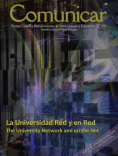
Comunicar
Scope & Guideline
Fostering interdisciplinary collaboration for global impact.
Introduction
Aims and Scopes
- Interdisciplinary Integration of Arts and Sciences:
The journal promotes research that bridges the gap between the arts and sciences, particularly through innovative educational frameworks such as STEAM education. - Impact of Digital Media on Society:
A significant focus is placed on analyzing how digital media influences social behaviors, educational practices, and public discourse, especially among younger demographics. - Media Literacy and Education:
The journal emphasizes the importance of media literacy in education, advocating for critical engagement with media content to develop informed citizens. - Technological Innovations in Education:
Research that explores the application of new technologies in educational settings, including the use of digital tools for enhancing learning experiences, is a core area of interest. - Cultural and Social Issues in Communication:
The journal addresses various cultural and social issues, including representation, identity, and the effects of social media on societal norms and behaviors.
Trending and Emerging
- Digital Media and Youth Engagement:
There is an increasing focus on how digital media platforms, such as TikTok and Instagram, shape the behaviors, identities, and engagement of youth, underscoring the importance of understanding these dynamics in educational contexts. - Artificial Intelligence in Education:
Research exploring the role of artificial intelligence in educational settings is on the rise, particularly regarding its impact on learning processes and student engagement. - Health Communication and Media:
Emerging studies are focusing on the intersection of health communication and media, especially in the context of public health crises like COVID-19, emphasizing the role of media in shaping health narratives. - Critical Media Literacy:
There is a growing trend in promoting critical media literacy as a vital skill for navigating the complexities of modern information environments, particularly in relation to misinformation and digital empathy. - Sustainability and Education:
Research linking sustainability concepts with education—particularly through innovative and interdisciplinary approaches—has gained traction, reflecting global priorities around environmental issues.
Declining or Waning
- Traditional Media Studies:
There appears to be a waning interest in traditional media studies, as the focus shifts towards digital media and its implications, reflecting the rapid evolution of communication technologies. - Static Educational Models:
Research centered on static or conventional educational models is becoming less prevalent, with a growing emphasis on dynamic, technology-infused pedagogical approaches. - General Audience Research:
While audience research remains important, papers focusing on generic audience behaviors without specific contexts or platforms are less frequently published, indicating a move towards more nuanced studies.
Similar Journals
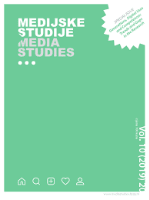
Medijske Studije-Media Studies
Fostering Critical Dialogues in Media ScholarshipMedijske Studije-Media Studies, an esteemed journal published by SVEUCILISTE & ZAGREBU, FAK POLITICKIH ZNANOSTI, is a pivotal platform in the field of communication studies and media research. Established in Croatia, this Open Access journal since 2010 features a diverse array of research articles that explore the multifaceted relationships between media and society. With its ISSN 1847-9758 and E-ISSN 1848-5030, the journal serves an international audience and is committed to disseminating innovative insights that drive media scholarship forward. Currently ranked in the Q3 category in Communication and Q4 in Computer Science Applications for 2023, it reflects its growing influence, capturing vital trends and analyses that resonate in both academic and practical realms. The journal's Scopus rank sits at #337 out of 511 in Social Sciences_ Communication, placing it within the 34th percentile, thus establishing its relevance in the global discourse on communication. Researchers, professionals, and students are encouraged to engage with this resource as it continues to forge connections between media studies and contemporary societal issues.

Revista Sonda-Investigacion y Docencia en Artes y Letras
Exploring the Intersection of Arts and EducationRevista Sonda-Investigacion y Docencia en Artes y Letras, published by the ASOCIACION INVESTIGACION, FORMACION CREATIVIDAD, is a pivotal platform for scholars and practitioners in the fields of arts and letters. This esteemed journal, identifiable by its ISSN 2254-6073, seeks to foster a comprehensive understanding of interdisciplinary approaches to the study and teaching of the arts, contributing significantly to the academic discourse in this vibrant domain. With a commitment to open access principles, it enables wider visibility and accessibility of research findings, making significant contributions to the advancement of knowledge in both creative and educational sectors. Although specific metrics like HIndex and impact factor are not detailed, the journal is poised to play a critical role in shaping contemporary artistic education and research within and beyond the borders of Spain, specifically from its base at the Universidad Politécnica de Valencia. By providing a repository for innovative research and pedagogical strategies, *Revista Sonda* appeals to researchers, educators, and students alike, encouraging collaboration and the exchange of ideas that will drive the field forward.
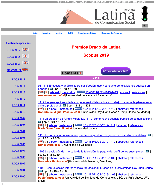
Revista Latina de Comunicacion Social
Fostering Dialogue in the Heart of Communication StudiesRevista Latina de Comunicación Social is a prestigious and influential journal in the field of Communication, published by Historia Sistemas Informativos - HISIN. Established in 1998, this Open Access journal has continually contributed to the dissemination of high-quality research and innovative perspectives within the discipline. Based in Madrid, Spain, it has established itself as a vital platform for scholars, professionals, and students alike, particularly with its impressive ranking in the 2023 Scopus Ranks, where it sits at Rank #47 out of 511 journals in the Communication category, placing it in the 90th percentile. The journal embraces a broad scope that tracks the evolving trends and technologies in communication, with its Q1 status in Communication underlining its commitment to publishing impactful research. As it converges its years from 2011 to 2025, the journal remains dedicated to fostering academic discourse and engaging with emerging themes that shape the digital and traditional communication landscapes.

Plaridel
Uplifting Voices, Bridging Discourses.Plaridel is an esteemed academic journal dedicated to the field of communication, published by the University of the Philippines Diliman. With the ISSN 1656-2534, this journal embraces a significant role in fostering scholarly dialogue and advancing research within the rapidly evolving landscape of communication studies. As one of the platforms in the Philippines, it aims to uplift local and international discourse by featuring innovative research, critical reviews, and theoretical explorations relevant to various facets of communication. Although currently rated in the Q4 quartile for 2023 in the Communication category, Plaridel's commitment to quality and scholarly rigor reflects a promising trajectory for future impact. The journal has been operational since 2018 and welcomes a wide array of contributions, especially from emerging scholars. Open access provides greater accessibility to researchers and enthusiasts, promoting broader engagement with the journal’s content. Plaridel holds an important place within the academic community, aspiring to elevate standards of communication research and practice in the Philippines and beyond.

Vivat Academia
Advancing Knowledge, Inspiring Change.Vivat Academia is a prestigious peer-reviewed journal dedicated to advancing knowledge and scholarly discourse in the fields of education and social sciences. Published by FORUM XXI, this journal has been an open access platform since 1991, promoting unrestricted access to research that fosters understanding and innovation in academia. With its ISSN 1575-2844, Vivat Academia provides researchers, professionals, and students with a robust repository of original articles, reviews, and case studies. By facilitating discussions and sharing insights on contemporary education practices and social dynamics, it remains an invaluable resource for those seeking to influence policy and pedagogical approaches. Registered at CALLE CINE 38 BAJO DERECHA, MADRID 28024, SPAIN, this journal exemplifies the commitment to fostering an inclusive and progressive academic community, ensuring that valuable research reaches a global audience.
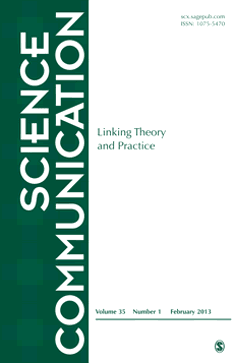
SCIENCE COMMUNICATION
Empowering Voices: Transforming Scientific DiscourseSCIENCE COMMUNICATION is a premier journal that has established itself as a vital platform for the exploration of the intersection between science, society, and communication practices. Published by SAGE Publications Inc, this journal boasts a commendable impact within the field, evidenced by its 2023 ranking as Q1 in Sociology and Political Science, placing it in the top percentile of its category. With an impressive Scopus rank of 14 out of 1466 in the social sciences domain, it serves as an essential resource for researchers, professionals, and students dedicated to understanding how scientific information is communicated and perceived across various platforms and audiences. Spanning a rich publication history from 1979 to 2024, SCIENCE COMMUNICATION publishes original research, case studies, and reviews that contribute to the development of effective communication strategies in science. Although the journal does not currently offer open access options, its content remains pivotal for fostering informed discourse within academia and beyond. Engaging with this journal is invaluable for anyone interested in enhancing science literacy and engagement in contemporary issues.
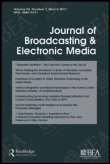
JOURNAL OF BROADCASTING & ELECTRONIC MEDIA
Engaging Scholars in Critical Media DiscourseThe JOURNAL OF BROADCASTING & ELECTRONIC MEDIA, published by Routledge Journals, Taylor & Francis Ltd, is a premier academic publication in the field of communication, officially recognized in the Q1 category for its exceptional quality and impact. With a rich history dating back to 1985, this journal serves as a vital platform for innovative research and critical discussions surrounding broadcasting and electronic media, addressing contemporary issues in digital communication, media technology, and audience studies. The journal boasts an impressive Scopus rank of #73 out of 511 in the Social Sciences - Communication category, placing it within the top 15% of its field. Researchers, professionals, and students alike benefit from its insightful articles that contribute to understanding the evolving landscape of media and communication. Although it does not currently operate under an Open Access model, its rigorous peer-review process ensures that published works meet high academic standards, sustaining its reputation as a cornerstone for scholarly discourse in the media industry.
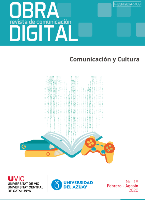
Obra Digital-Revista de Comunicacion
Exploring the frontiers of communication studies.Obra Digital-Revista de Comunicacion is a leading academic journal in the field of communication studies, published by UNIV VIC in Spain. Since its establishment in 2011, it has embraced an Open Access model, ensuring that research outputs are freely available to a global audience, thus fostering greater accessibility and collaboration among scholars. With an ISSN of 2014-5039, the journal aims to provide a pivotal platform for the dissemination of innovative research that addresses contemporary issues in communication theory and practice. The journal’s scope encompasses a wide range of topics, including digital media, interpersonal communication, and cultural studies, making it an essential resource for researchers, professionals, and students alike. Despite the absence of an HIndex and specific ranking metrics, Obra Digital stands out as a valuable forum for critical dialogue and scholarly exploration in the evolving landscape of communication. As the field continues to grow, this journal remains committed to advancing knowledge and fostering academic discourse.
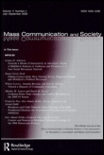
Mass Communication and Society
Unveiling the Impact of Communication on Social ChangeMass Communication and Society is an esteemed journal published by Routledge Journals, Taylor & Francis Ltd, focusing on the dynamic field of communication studies. With its ISSN 1520-5436 and E-ISSN 1532-7825, the journal has established itself as a leading platform for high-quality research since its inception. With a prestigious positioning in the Q1 category of Communication as of 2023, it ranks impressively at #45 out of 511 in Scopus within the social sciences communication sector, boasting a 91st percentile in its field. The journal serves as a vital resource for researchers, professionals, and students interested in emergent issues, theories, and methodologies related to mass communication and its impact on society. Although it does not offer Open Access options, the journal remains committed to advancing scholarly discourse and providing rigorous insights into how communication shapes social dynamics. Since its converged years from 2008 to 2024, Mass Communication and Society continues to push the boundaries of knowledge in a rapidly evolving academic landscape, making it a must-read for anyone invested in the communication discipline.

Dixit
Unveiling Insights into Human NarrativesDixit is a respected academic journal published by Universidad Católica del Uruguay, Facultad de Ciencias Humanas, primarily focusing on the fields of humanities and social sciences. With an ISSN of 1688-3497 and an E-ISSN of 0797-3691, this journal has been a fully Open Access publication since 2007, enabling free and unrestricted access to its high-quality research. It serves as a vital platform for scholars, researchers, and students to explore innovative ideas and disseminate valuable findings that contribute to the understanding of human experiences across various contexts. The journal's commitment to open access not only promotes knowledge sharing but also facilitates cross-disciplinary dialogue, making it an essential resource for anyone seeking to deepen their insights into the humanities. By fostering collaboration and engaging the academic community, Dixit plays a pivotal role in advancing scholarly discourse in Latin America and beyond.